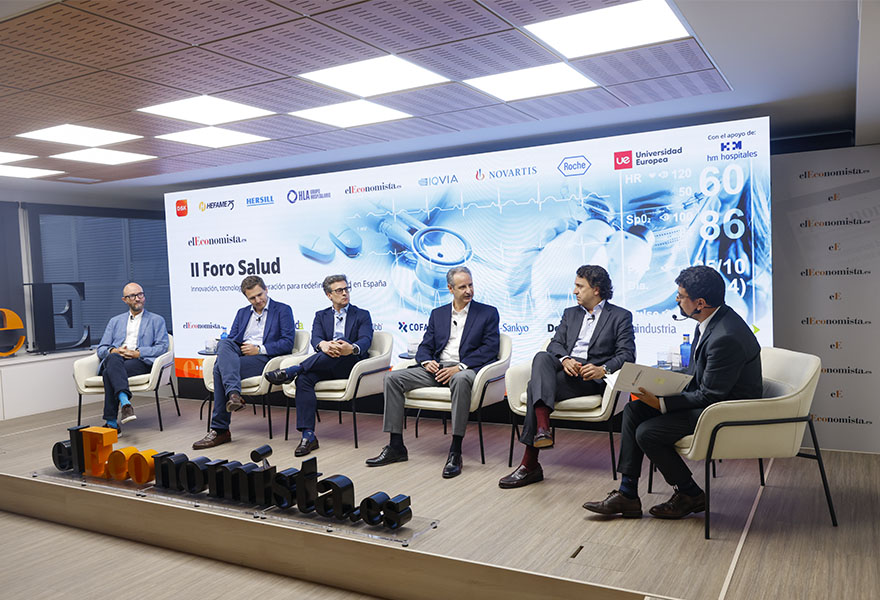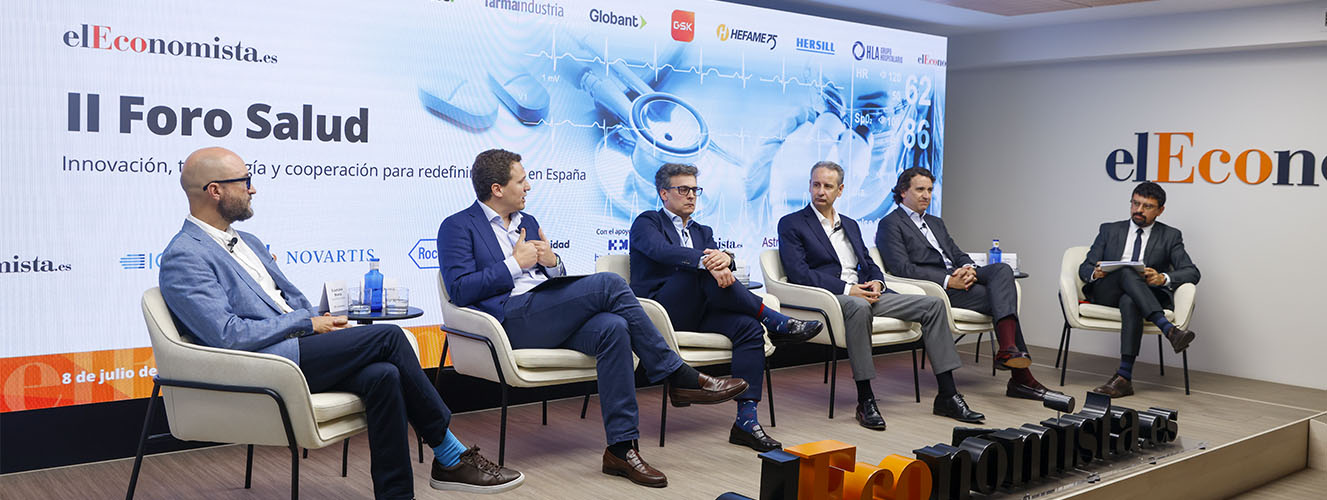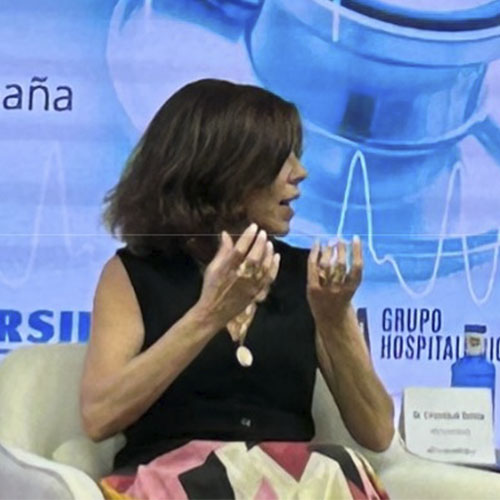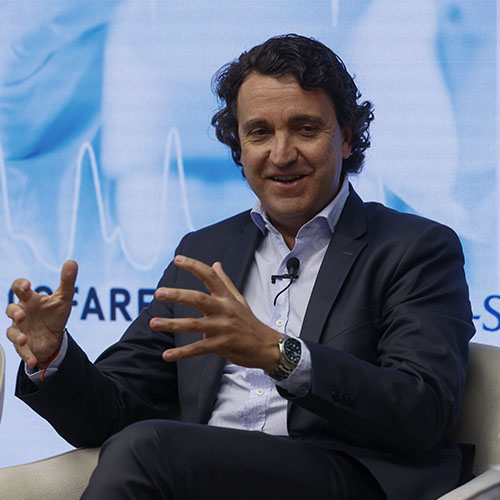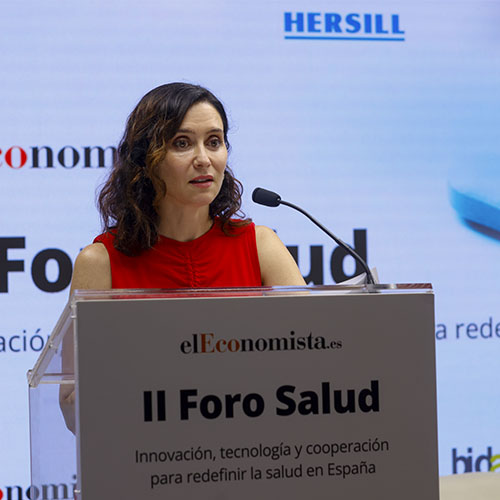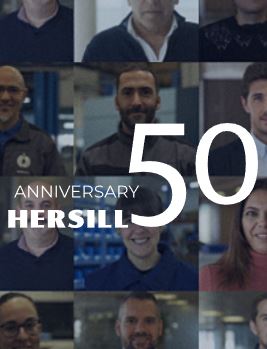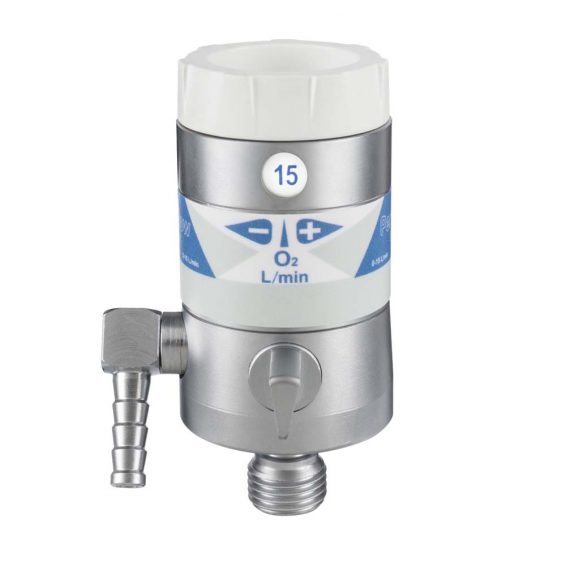HERSILL | NEWS | EVENTS | UPDATES |
On 8 July 2025, Hersill took part in elEconomista 2nd Health Forum, a meeting that brought together leaders and experts from the sector under the slogan “Innovation, technology and cooperation to redefine healthcare in Spain”. The event, held in Madrid, became a meeting point to discuss the challenges and opportunities for Spanish healthcare at a time of transformation marked by digitalisation, sustainability and the need for collaboration between all actors in the system.
A roundtable to promote an innovative and sustainable healthcare ecosystem
The debate in which Hersill took part was moderated by Mr. Cristian Gallegos, director of Health and Gaceta de Salud of elEconomista, and included the participation of Mr. Pablo Crespo, Secretary General of Fenin; Mr. Oscar M. Jordan, Manager of Hersill; Mr. Lucas Najun, Healthcare & Life Sciences Studio Partner at Globant; Mr. Ignacio Chueca, General Manager of IQVIA Spain; and Mr. Juan Jose Beunza, Professor of Public Health and Director of IASalud-UEM at the European University.
During the session, the importance of creating an innovative, ethical and sustainable healthcare ecosystem to respond to the current challenges of the system was highlighted. In this sense, Ms. Marta Villanueva stressed that “we are at a time of absolute revolution where the healthcare we knew is changing and adapting to what society needs. The healthcare ecosystem must be innovative, ethical and sustainable in order to respond to a context marked by the ageing of the population, the chronicity of diseases and patients’ need for access”.
In line with this idea, Oscar M. Jordan argued that “it is necessary to promote the virtuous circle of the health system: channelling investment in education, research and health towards the development of industrial capacities in Spain. What is not industrialised does not reach the patient and does not cure”. The manager of Hersill stressed that this balance is key so that the ideas generated in hospitals and research centres become real solutions that generate employment, wealth and resources for the system.
Mr. Cristobal Belda, Chief Medical Officer of HM Hospitales, also stressed the urgency of industrialising processes to protect the essential: “there is nothing that will be able to replace the moment when a nurse or a doctor is with a patient in a physical way to treat a real disease. In order to maintain that moment of craftsmanship in the coming years in the face of pathologies such as cancer, a heart attack or stroke, we will have to industrialise a large part of everything that happens on a daily basis”.
Tangible technology and national capacities
The conversation addressed the role of artificial intelligence and the need to incorporate it with guarantees into the healthcare system. In the words of Pablo Crespo, “AI must arrive safely, without compromising the integrity of patients. We cannot assume the risk of algorithms applied without validating their reliability”.
In this context, Oscar M. Jordan focused on the importance of strengthening national capacities: “If the future of healthcare technology in Spain does not involve in-house development, we are in over our heads. We saw it in the pandemic: when critical moments arrive, national capacities are fundamental”. He also stressed that “as developers of medical equipment, we understand that the patient will always require a physical device, a machine, a gas system or a robot, i.e. a tangible technology, which can be complemented with emerging technologies for greater efficiency and better patient care”.
Public-private partnership for a robust system
Another key point was the need to strengthen collaboration between the public research ecosystem and private industry. Oscar M. Jordan insisted that “it is not conceivable for health industrialisation to advance without private industry. We need aid to enable projects to materialise and regulatory changes to create the right breeding ground”.
This message connects directly with the campaign “Technologies that make a country”, promoted by Hersill to highlight the role of the Spanish technology industry in the generation of employment, wealth and industrial autonomy.
A forum that encourages the necessary debate
The II elEconomista Health Forum was also attended by institutional leaders such as Miss. Isabel Diaz Ayuso, president of the Community of Madrid, who highlighted the relevance of national companies, including the smallest ones, as actors that help to streamline and strengthen the health system.
Hersill Commitment
Hersill’s presence at this meeting reaffirmed its commitment to technological innovation at the service of people. The company remains committed to solutions that optimise hospital management and improve patient care, always with the premise that technology only makes sense when it translates into quality of life and well-being for those who need it.
Hersill is part of the Technologies that make a country campaign (#TecnologíasQueHacenPaís), which showcases the technological companies that develop, manufacture and innovate in Spain. Its work is actively contributing to the strengthening of the national technology industry, the creation of jobs and economic progress, while reinforcing Spain’s industrial autonomy to face the challenges of the future.

